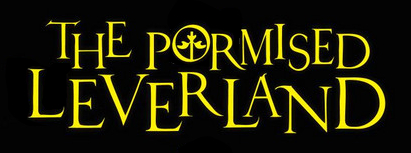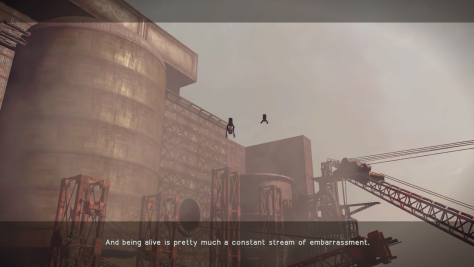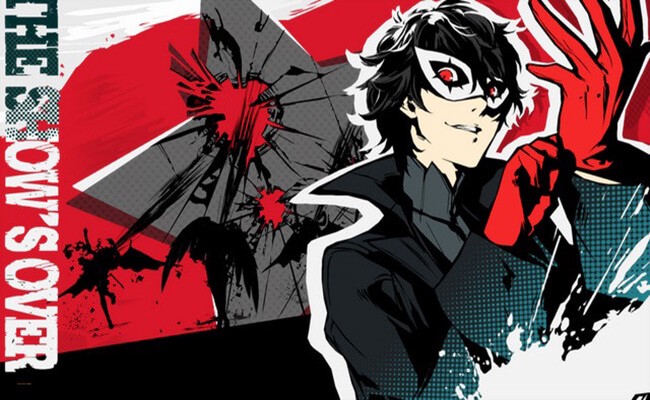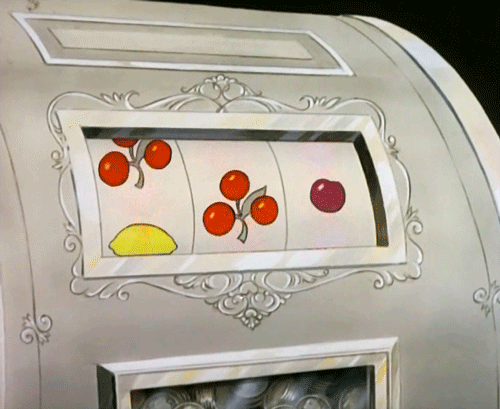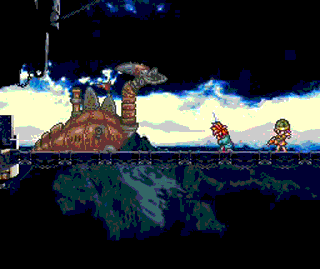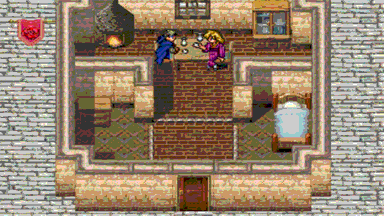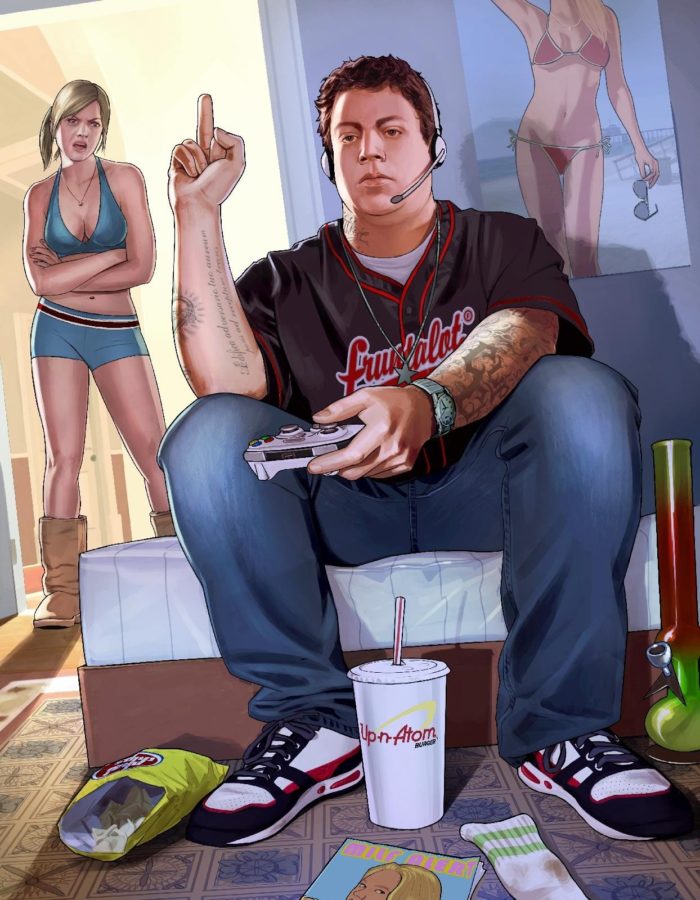I get the sensation of being a well-built killing machine refined from millennia worth of war data. The slashing, shooting, and dodging come from the previous NieR, but these actions are amped up in every way, bigger, faster, and most importantly, effortless. You don’t even have to hold your weapons most of the time!
I did not get the point of making the differences between each difficulty level so severe. Easy mode is basically meant to allow you to experience the story without much heartache. Normal mode is meant to be just challenging enough to make the proceedings feel dramatic without being punishing, but most difficulties can be solved by just… using a healing item when your HP get low, and failure usually comes less often from a desperate struggle than being too lazy to pull out a Medium Recovery in time. Hard mode decides to pair harder-hitting enemies with the inability to even lock on to them — TWO new challenges to get used to! The wish for a mode between Normal and Hard meant a constant feeling that there was some alternate version of the game that I’d rather play.
I get the feeling that chips and their customization were meant to be the central mechanic of the game, or should have been. They offer the clearest encouragement to pay attention to the way you play, either enticing you toward different strategies or allowing to you make your current methods even more effective through the clever combination of fusion of the right chips. They’re also a constant reminder that you are not human, driven home brilliantly by the fact that your entire chip set is customizable except for your core processor, which you need to literally function.
I don’t get why chips are sidelined by less interesting mechanics, specifically the acquisition and equipment of multiple weapons. I changed up my weapon sets at maybe two points in the game, but I’m sure I wouldn’t have had a problem with using only the first two swords the whole time. I’ll grant that different weapon choices can provide different tactical advantages — this is especially true when countering after a dodge can result in a rising slash, a spinning attack, or a forward thrust — but there isn’t enough motivation to try even half of the 38 weapons you can get. I would rather have had twice as meant chip sets as they provide, and I would have MUCH rather had the option to switch between chip sets from the quick menu instead of weapon sets!
I get the world design. The best way to illustrate a foot soldier’s part in a global conflict without actually bringing the globe into it is to give them dominion over a large contained area filled with distinct zones. The “ruined city” and its neighbors can either represent to the entire world, or just one apparently very important metropolis. This “anywhere”-ness accentuates the distant, fable-like tone of the game. The minimalism of the game’s style helps there, as well. Though tying your narrative to a mostly empty world populated by featureless automatons probably made the producers happy. *taps nose twice*
I get the side quests. In the last NieR, sidequests were an absolute nuisance that padded out the game and got in the way of the story. In Automata, the side quests, justified as operations to assist the android Resistance and gather intelligence on the machine threat, ARE the story. The simple act of being on Earth and being sentient — being alive — makes machines act strangely, and the game shows basically every possible permutation of ageless, disaffected robots looking for purpose. We see machines love each other, hate each other, try to be human, try to be BETTER than human, embrace struggle, find out what it means to live, what it means to be. Most define themselves by a single trait — the way most NPCs tend to do, right — and either embrace or are trapped by it. They so often act like any quest givers in any video game, but by merely knowing that their identities and desires originate from an entirely artificial place, your decision to take on these missions means elevating the stakes of their pantomime and recognizing their will, in turn asserting that everything is meaningless until you provide meaning to it. Magnifying this sensation is the ever-present irony that the self-serious androids, despite looking human, make far fewer attempts at acting human than most machines you meet. This is what it really means to ask the question, “What is it to be human?” This is truly science fiction.
I get the abstraction of time, kind of. It’s unclear how much time passes over the course of the game, especially when you take on sidequests that cut to a title reading TWO DAYS LATER once in a while, but it’s long enough to feel like an active and momentous number of weeks — months? — in the war against the machine threat, and long enough for 2B and 9S to form a working relationship.
That said, I don’t get the relationship between 2B and 9S. 2B is cold and 9S is outgoing, right? That comes across very effectively in the way they work together. 9S not only does most of the talking between the two of them, he also does most of the talking to NPCs on behalf of the both of them, not just because he’s naturally a talker, but because 2B either comes to expect this of him or allows him to. Their closeness is most believable in the subtle transition after a number of missions, when they go from clashing with each other to becoming comfortable in their complimentary roles.
That is, until their roles get switched up seemingly at random. They have a bad habit of mixing up their “machine’s have wills and are interesting” / “machines have no wills and must die” routine whenever they come across a new set of strange robots, with 9S being pretty inconsistent. 9S is the older model, yet he needs to be reminded that emotions are prohibited by YoRHA. And then 2B seems to forget about the emotion prohibition, and is even the first to shed tears! I get the change that’s being illustrated here, with the cold soldier getting in touch with her feelings, but there is basically no proper set-up for this moment. That is, unless you assume that she learned the value of caring for others from the sidequests you complete, which passes the work of convincing the audience that 2B and 9S have a reason for caring about each other onto the audience itself.
Actually, this is the abstraction of time coming back to bite us in the ass. Relationships presented between NPCs are suggested to have endured for centuries, but we’re supposed to believe that these taciturn androids are soul mates after… what, a month?
So I don’t really get where 9S’ enduring affection for 2B comes from, but I sort of do get that his obsession with the loss of 2B is meant to be analogous to his loss of purpose as her supporter, a member of YoRHA, and a defender of humanity when the shit hits the fan at the top of act three.
I don’t get A2. The most interesting possibility in the discovery of A2 is that there is a powerful android who lives off the grid who might be able to able to provide a new perspective into YoRHA’s real workings. Instead A2 is just like… a tough loner, and that’s it. It’s not even clear what her deal is unless you gather intelligence documents to reveal that she was an older model sent on a previous secret mission by YoRHA, which you… basically already know before you play as her.
Her ultimate purpose is to represent the desire of living for living’s sake in contrast to 9S’ madness-induced nihilism at the climax, but the path feels clumsy. Wasn’t there some other way to have this emotional moment? Why couldn’t the story be constructed so that 2B an 9S were facing each other in the end, and have their point of contention be disagreeing on what to do with the information that humanity is extinct?
I get that the game wants to shake things up once in a while by having you control different characters. It does this pretty well, most notably with the little machine getting oil for its “big brother” at the start of 9S’s story, an especially brutal moment when you trip and spill it everywhere. It really helps you understand the stark difference between the effortless flow of the androids and the ponderous gesticulating of the machines.
I don’t get 2B actually being 2E. I have no idea if that news is meant to momentous or not. If 2B’s whole thing was making sure 9S never got to the truth, what circumstances decide whether she is cold and dutiful about it or emotional and remorseful about it? Has this cycle repeated outside of the game as played? Moreover, the shallow “gotcha” of 2B’s identity switcharoo undermines 9S’ decisions to keep the truth of humanity’s extinction from 2B. Which sounds like a more interesting secret: the beliefs of every sentient thing on Earth are based on a lie, or “Actually, it was a different letter”?
I don’t get why Project YoRHA is designed to end the way it does. Considering the purpose of its formation — to boost android morale, a nebulous concept; why not just… program androids that have morale? — why violently end something that was fake, anyway? To hide its existence from who? The machine network’s purpose for fighting continuously — so it can evolve — makes more sense in comparison. But what does creating and destroying a military force actually do for humanity’s memory?
I do get the repetition of ironic circumstances of origin and the maddening implications of being created in the image of another and being forced to rely on that other. It happens first and most obviously with Adam and Eve, the game using the names of the first biblical humans to make it VERY CLEAR that one is derived from the other. But it happens again when you meet A2, the Adam to 2B’s Eve, and in a way it happens again in reverse, when 2B passes on her sword with her data to A2. And it happens again, most saliently, when 9S discovers that YoRHA’s black boxes are based on the same technology as the cores of machines. Not only does YoRHA as an organization exist because of the machines, but, literally, members of YoRHA can only exist because of the machines. This irony is the core of the absurdity of all conflict.
I don’t get the obsession with repetition and multiple endings. What if instead of being split into multiple playthroughs, the game was just… the game? And then there were just two endings: A2’s and 9S’. After all, those are the only endings that require a choice tobe made, while the ones before that happen as a matter of course.
If you are going to have multiple playthroughs, I don’t get why you would spoil the future ones. After playing as 9S, I assumed that the next playthrough would be as A2 — an easy assumption to make since you spend two playthroughs picking up Taunt chips you can’t use. I was so surprised to see that the third playthrough didn’t go back in time, but forward!
… Is what I would say if the second playthrough didn’t end with a teaser for what happens in the third playthrough. The one I was… about to play. Why would they do that?
Now, I do get one part about the second playthrough: being on the other side of 2B’s reboot after the first mission and watching yourself from the first playthrough make your configurations. The sensation that I was watching and BEING watched in that way felt like a very personal moment, and was the perfect way to get across the feeling of being connected to someone else. That felt like a door was opening onto the possibilities of seeing the same story from a different angle. There should have been more of those moments.
The only other moment that matches, and exceeds, the success of that one is, of course, ending E.
One of the great ironies of Automata is that the least humanoid characters are the ones to exhibit the greatest humanity (that is, the belief that life is worth living regardless of its purpose). That the belief that 2B, 9S, and A2 have a right to live comes from 2B’s support pod, the most primitive of all the artificial beings you ever meet — and that it’s able to awaken to this will over the course of the third act just by talking and learning to understand somebody else — is such a beautiful notion that I want to cry just thinking about it. (That said, I don’t get why the pods being the moral center of the story isn’t set up earlier; it could’ve been a great bookend).
Being in a bullet hell battle with the credits is goofy at first (I mean, Smash Bros. did this in ’98) until you get that you are literally fighting the concept of Ending. And I get the concept of your friends lending you their Friend Energy has been applied in every anime or anime-adjacent story from Dragonball to Persona. But other people who’ve played the game cheering you on from all over the world and then joining your game to die for you as the song swells in multiple languages feels like a completely unique experience in the moment.
And the notion that this game, a follow-up to a game that was already bleak, turned out to be even more bleak for most of its playtime, then flips it around to being happy and culminates in asking you to be part of something huge by giving up your save data to help someone you’ll never meet, an act that in the moment feels more like a gift than a sacrifice… I get that.
I get that finding meaning in life is recognizing and caring for the life of someone else.
I get that Automata tells clear, ringing truths by using its game mechanics to drive the story. I get that its points are muddled, hollowed, and prone to “anime logic” when using only its script to tell the story. I get that Automata’s best moments are playable. I get that its worst moments are not.
I don’t get a lot of the game’s trappings. I don’t get wanting to reach a broad audience while always conveying the sensation that you missed something by not playing the first NieR. I don’t get combining action and RPG mechanics until each ultimately diffuses the effectiveness of the other. I don’t really get the plot’s layered double-crossings and obfuscations of motivation that still manage to leave emotional moments in cutscenes feeling unclear or unearned.
Despite that, I get the feeling that Automata knows what its purpose is, which seems to be the point.
